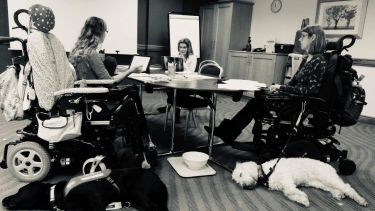Anti-ableist Environments
Experimenting with new ideas for inclusive recruitment and employment

University researchers: Dr Kirsty Liddiard and Dr Armineh Soorenian
Project partners: Pathfinders Neuromuscular Alliance and National Association of Disabled Staff Networks
This Priority Area of WAARC explores two key areas.
Recruitment
Problem: The under-recruitment of disabled researchers and research support staff due to systemic barriers.
Strategic plan: A work stream promoting the inclusive recruitment of disabled researchers that will review job description, specification, marketing and publicity, essential/desirable criteria, training materials for panel members and involvement of disability organisations in the recruitment process. We will work closely with our Project Partners to ensure that our proposals respond to current policy and legislation as well as adhering to key matters of disability justice.
Workplan: We will reviewed 10 Recruitment Case Studies of previous, current and future research posts. Each Recruitment Case Study allowed us to review job description, specification, marketing and publicity, essential/desirable criteria, training materials for panel members and involvement of disability organisations in the recruitment process. We anticipate using up to four semi-structured qualitative interviews with each disabled researcher staggered over the lifetime of the project in line with the action research cycle (n = 40). We will also conduct interviews or focus groups with colleagues involved in recruitment processes (n = 20) and work closely with our Project Partners to ensure that we respond to current policy and legislation and disability justice.
Deliverables:
- Inclusive recruitment - advise on writing the job description, through advertising, Disability Confident Scheme, FAQs, shortlisting and interviewing. Drawing on advice from Speakup Self-advocacy.
Employment
Problem: Lack of imagination about how research positions can be configured in ways that attract and retain disabled researchers.
Strategic plan: A work package promoting equitable and inclusive forms of employment for disabled researchers including job profiling, flexible working, responsive institutional responses to reasonable adjustments, relationships with University HR, Contracts, Finance, Occupational Health, and Access to Work arrangements. We will also explore the payment and consultation arrangements with disabled non-academic research partners.
Deliverables:
- Support for and by disabled staff in the university - documenting the work and impact Disabled People's Organisations on University culture.

iHuman
How we understand being ‘human’ differs between disciplines and has changed radically over time. We are living in an age marked by rapid growth in knowledge about the human body and brain, and new technologies with the potential to change them.
